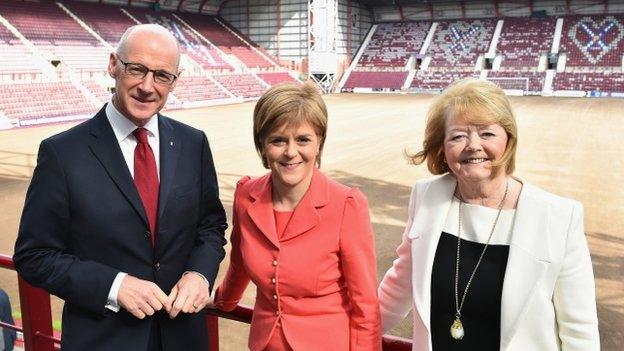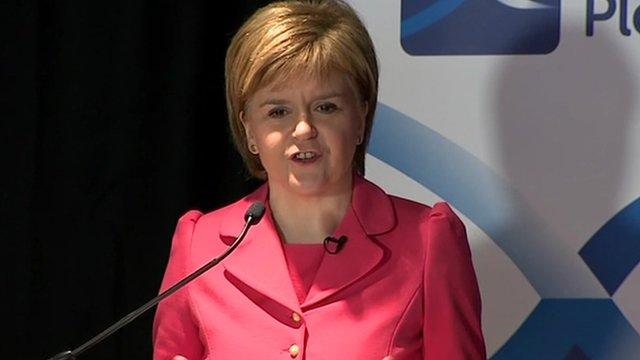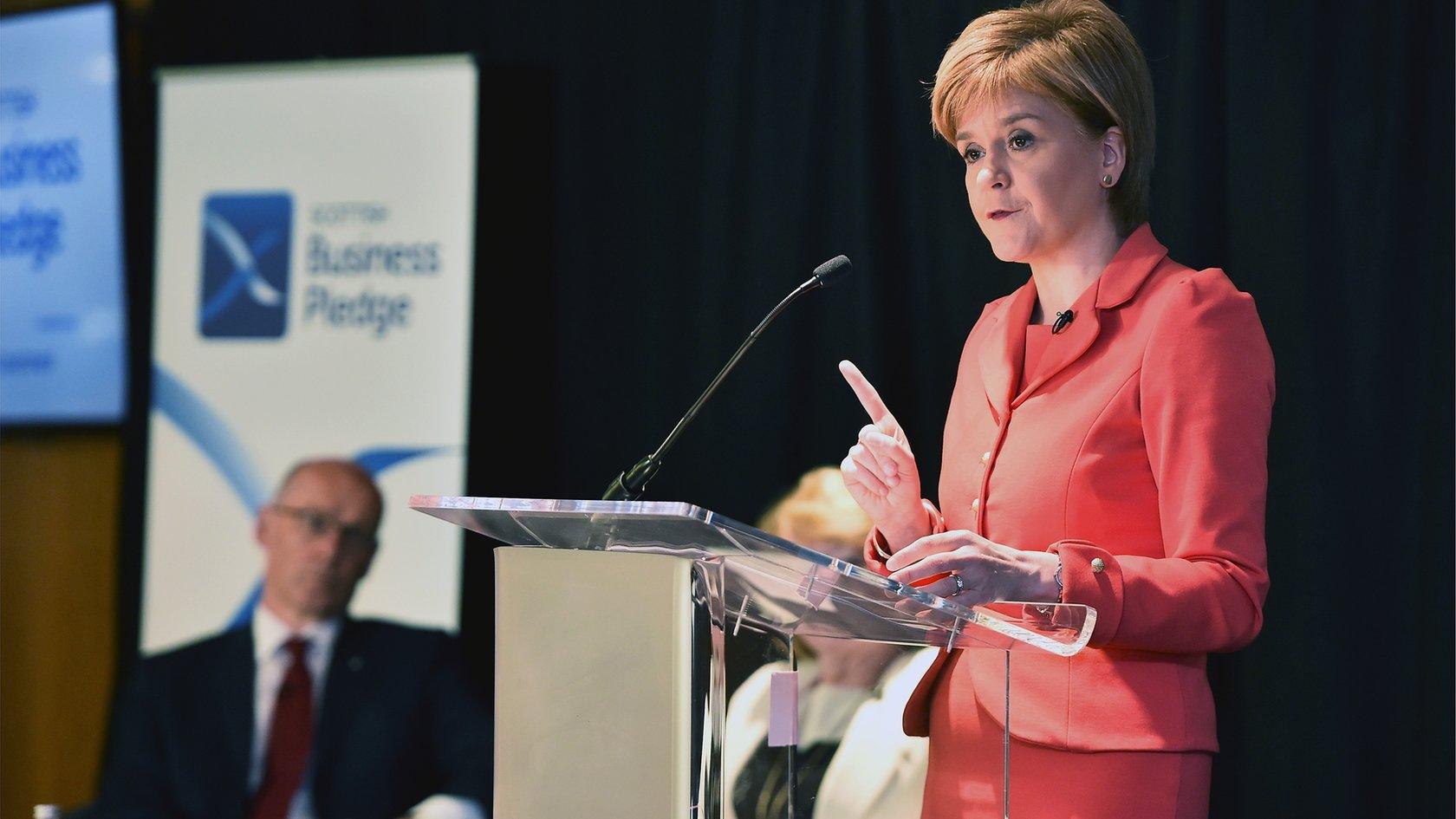Nicola Sturgeon attacks Westminster spending cuts
- Published
Nicola Sturgeon on the spending cuts proposed by the Conservative government
First Minister Nicola Sturgeon has used a speech in Edinburgh to attack the "scale and speed" of spending cuts planned by the UK government.
Speaking ahead of the Queen's Speech, the SNP leader also reiterated her party's support for Britain's continued membership of the European Union.
She made the speech on a visit to Heart of Midlothian FC's Tynecastle Stadium.
She was joined by the Scottish Finance Secretary John Swinney.
The pair also unveiled the Scottish Business Pledge which aims to promote "fairness, equality and sustainable economic growth".
'Slow recovery'
An "alternative to austerity" was the centrepiece of the Scottish National Party's successful general election campaign.
In her first major economic speech since the election, Ms Sturgeon argued that the prime minister cannot ignore the democratic will of the Scottish people.
She said: "The result of the general election provides an opportunity and a challenge for the Scottish government. There is clearly an opportunity to ensure that Scotland's priorities are better understood.
"But there is also a significant challenge in working with a majority government at Westminster - many of whose policies we disagree with.
"We will continue to oppose spending reductions of the scale and speed that the UK government has suggested. These would slow economic recovery and make deficit reduction more difficult - something shown by the impact of the cuts imposed after 2010."
Ms Sturgeon said David Cameron must either change his approach or find ways to lessen the impact on Scotland.
She also said that business, employees and government needed to work more closely together to build a prosperous and cohesive society.
The SNP leader again insisted that the UK should only withdraw from the EU if there was a majority in favour of exit in all four nations of the UK.
She said: "Since a referendum is now inevitable we will work to protect Scotland's interests in that referendum. We'll propose a double majority meaning that exit from the European Union would only be possible if all four nations agreed to that, something that would ensure that Scotland couldn't be forced out of the European Union against our will.
"And during the run up to the referendum, the Scottish government will of course make a strong and positive case for staying in the EU."

Ann Budge (right) joined John Swinney and Nicola Sturgeon at Tynecastle Stadium.
The first minister also called on businesses to commit to paying the living wage and promoting fair practices as she launched a new industry code.
Companies wanting to sign up to the Scottish Business Pledge must agree to pay the living wage to all direct employees over 18.
They must also be delivering on at least two of the pledge's nine components, as well as committing to achieving the rest "over time".
'Perfect match'
Speaking on BBC Radio Scotland's Good Morning Scotland programme, Scottish Finance Secretary Mr Swinney, said: "This has been described by the first minister as a shared national endeavour and I think that's exactly how we should look at this - government and business coming together.
"My priority is to get people into employment and then to make sure that as much of that employment as possible is high quality, productive employment, making a high-value contribution to our society."
Hearts, who recently won promotion back to the Scottish Premiership, are one of the first companies to sign up to the pledge.
The club's chief executive Ann Budge said: "By introducing the living wage across our business, by investing in youth education and staff education, by engaging fully with the community and by working closely with the Foundation of Hearts to introduce fan ownership, we are the perfect match for this initiative."
'More efficient'
Businessman Brendan Burns, who operates a forestry company and is a former UK policy chairman of the Federation of Small Businesses, told Radio Scotland's Kaye Adams programme that the Scottish government needed to address more than just the implementation of the living wage.
He said: "I pay more than the living wage, but that is not the point. To be able to pay the living wage, you have to get more efficiency into Scottish businesses.
"At this moment, that is what we don't have. Every businessman I meet will always say 'I would like to pay the living wage', but you can't pay out of a business if the profit isn't there. The profit is there when the business is more efficient."
Scottish Conservative enterprise spokesman Murdo Fraser MSP said many firms could not afford to pay the living wage and more incentives should be offered to businesses.
"In principle, the Scottish Business Pledge sounds like a decent strategy," he said.
"However, scratch beneath the surface and it would be realistic to say that many small to medium-sized business cannot afford to pay staff the living wage. This is particularly the case in sectors like care where income levels are set by the state.
"The Scottish government should be helping these businesses where they can. That's why we're calling for a living wage business bonus for small businesses which pay the living wage, in the form of a reduction in their business rates."
The Scottish Greens welcomed the new pledge but urged the first minister to go further and address environmental standards and tax avoidance.
MSP Patrick Harvie MSP said: "Given the clear opportunity Scotland has to develop a low-carbon economy that respects our finite resources, and the urgent need to meet our failed climate targets, it's disappointing that the environmental impact of business is barely mentioned in this pledge scheme."
"Ministers are also missing the chance to make a strong statement that tax dodgers won't be tolerated. "
- Published26 May 2015

- Published26 May 2015
